| Reviews & Columns |
|
Reviews DVD TV on DVD Blu-ray 4K UHD International DVDs In Theaters Reviews by Studio Video Games Features Collector Series DVDs Easter Egg Database Interviews DVD Talk Radio Feature Articles Columns Anime Talk DVD Savant Horror DVDs The M.O.D. Squad Art House HD Talk Silent DVD
|
DVD Talk Forum |
|
|
| Resources |
|
DVD Price Search Customer Service #'s RCE Info Links |
|
Columns
|
|
|
Deadwood: Complete First Season
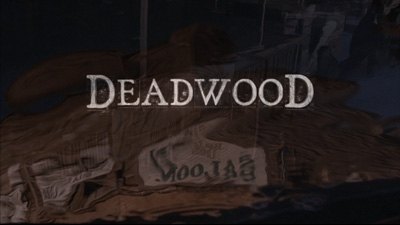
INTRODUCTION:
Leading up to the 1850s, the area known as the "Great American Desert" was largely ignored by the United States government and for the most part recognized as "Indian Territory", which at the time was predominantly inhabited by the Sioux. However, the mass migration of Mormons to Utah beginning in 1846, the discovery of California gold in 1848, and the creation of the Oregon Territory later that same year led federal lawmakers to take a growing interest in the region. By the time California became a state in 1850, it was clear that establishing a safe and secure route to the West was now a matter of significance, and the first Fort Laramie Treaty was signed with the tribes of the region, allowing the government to develop roads and military outposts along the California-Oregon Trail. In exchange for this safe passage, the lands to the north and south of the trail were to go undisturbed and remain in possession of the Sioux. As you would expect, the "White Man" did not abide by these conditions very long, and when gold was discovered in Montana, settlers drove into Indian Territory once more, causing significant bloodshed.
After the Civil War, the government tried again to work out a treaty, this time promising to use the military to ensure the protection of the Great Sioux Reservation and other areas of the Dakota Territory in exchange for even more territorial concessions. Not all of the tribes were prepared to accept this after being betrayed before, and the task of defending the region on both sides from angry prospectors as well as Indian insurgents proved too much for the cavalry, especially with so many deserters going off on their own search for gold. So in 1876, President Grant finally pulled out of the region completely, giving the prospectors free reign of what was now an outlaw community of mining camps. The heart of that community was a town that formed in the Black Hills of South Dakota named Deadwood. Without any government or law enforcement, this unique location and period in American history are the subjects of HBO's fascinatingly detailed series from David Milch, the co-creator of NYPD Blue. Heavily inspired by the real-life residents and events of the historic town, "Deadwood - The Complete First Season" is a rich morality tale set on this lawless edge of the American frontier.
CONTENT:
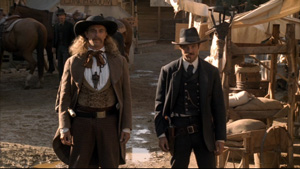 The year is 1876, shortly after General Custer's famous defeat at Little Big Horn, and prospectors are flooding the town of Deadwood in search of fortune. Among the new inhabitants are Seth Bullock (Timothy Olyphant), a retiring Marshall from Montana, and his friend and business partner Sol Star (John Hawkes). Bullock is tired of the pressures of being a lawman, and he wants to try his hand at a simpler lifestyle: running a modest hardware store and saving enough money so his wife and child can leave Montana to join him. Arriving about the same time is the legendary James "Wild Bill" Hickok (Keith Carradine), whose career as a gunfighter and lawman is wearing down, and he travels with his loyal friend Charlie Utter (Dayton Callie) and the famously foul-mouthed Calamity Jane (Robin Weigert). Before any of them really has a chance to get settled into town, circumstances arise that require the cooperation of Bullock and Hickok, and these two relatively honorable men immediately share a subdued level of mutual respect.
The year is 1876, shortly after General Custer's famous defeat at Little Big Horn, and prospectors are flooding the town of Deadwood in search of fortune. Among the new inhabitants are Seth Bullock (Timothy Olyphant), a retiring Marshall from Montana, and his friend and business partner Sol Star (John Hawkes). Bullock is tired of the pressures of being a lawman, and he wants to try his hand at a simpler lifestyle: running a modest hardware store and saving enough money so his wife and child can leave Montana to join him. Arriving about the same time is the legendary James "Wild Bill" Hickok (Keith Carradine), whose career as a gunfighter and lawman is wearing down, and he travels with his loyal friend Charlie Utter (Dayton Callie) and the famously foul-mouthed Calamity Jane (Robin Weigert). Before any of them really has a chance to get settled into town, circumstances arise that require the cooperation of Bullock and Hickok, and these two relatively honorable men immediately share a subdued level of mutual respect.
Already cemented in the community is the ruthless Al Swearengen (Ian McShane), the owner and manager of the Gem Saloon, which sells booze, gambling and women to just about everyone in town. Very little goes on in Deadwood that escapes his watchful eye, and anyone getting in the way of his business ventures is likely to find himself being fed to Mr. Wu's (Keone Young) ravenous pigs. He is connected in one way or another to everyone and everything in town, and while he is not an educated man, he has a keen understanding of how to manipulate others and is very good at separating them from their money. Assisting him in many of his endeavors is the proprietor of the Grand Canyon Hotel, E.B. Farnum (William Sanderson). Farnum is a somewhat awkward and cowardly man, but he has a surprisingly sharp mind when it comes to swindling others.
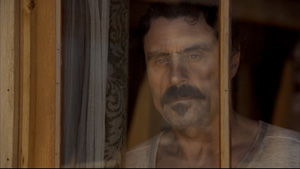 One of the people they try to swindle is a naive New Yorker named Brom Garret (Timothy Omundson), who has come to town to make his own fortune prospecting with the help of his family's considerable wealth. His wife Alma (Molly Parker) accompanies him, but her addiction to laudanum, supplied by town doctor Amos Cochran (Brad Dourif) for her "headaches", is such that she rarely leaves the confines of her hotel room, spending her days lying in bed or watching the world go by from her second-storey window. These characters, as well as many others, some of whom recently witnessed firsthand the horrors of the Civil War, form a rich and diverse camp that continues to grow with each passing day, and Deadwood is the story of how these unique personalities and motivations come together to turn a loose mining camp into a community.
One of the people they try to swindle is a naive New Yorker named Brom Garret (Timothy Omundson), who has come to town to make his own fortune prospecting with the help of his family's considerable wealth. His wife Alma (Molly Parker) accompanies him, but her addiction to laudanum, supplied by town doctor Amos Cochran (Brad Dourif) for her "headaches", is such that she rarely leaves the confines of her hotel room, spending her days lying in bed or watching the world go by from her second-storey window. These characters, as well as many others, some of whom recently witnessed firsthand the horrors of the Civil War, form a rich and diverse camp that continues to grow with each passing day, and Deadwood is the story of how these unique personalities and motivations come together to turn a loose mining camp into a community.
To say that Milch has reinvented the Western genre with this series is almost an understatement. Typical constructs like the reluctant lawman and the corrupt villain can be found within Deadwood, but the execution is far more rich and complex than has ever been done before. On the surface, the inhabitants of the camp appear to be typical Western stereotypes, but as the show develops, we find that this is most certainly not the case. The most interesting of these characters is the aforementioned Al Swearengen, who is brilliantly portrayed by Ian McShane. This is a detailed and complicated character unlike most anyone else on television today, save perhaps Tony Soprano, and the award McShane took home for Best Actor at the Golden Globes is likely the first of many statues he will be collecting in the coming years. Much like Soprano, Swearengen lives by his own strict and unflinching code of morals, most of which seem appalling to others, and he never apologizes for his often merciless actions. He is ruthless in his pursuit of profit, and there is much blood on his hands, but he also understands better than anyone else that while Deadwood may be without law, it cannot be without order, as that would be bad for business. He also recognizes the delicate balance necessary for the camp to be left alone by the government without coming across as secessionists, and he is the one spearheading much of the positive development in the town.
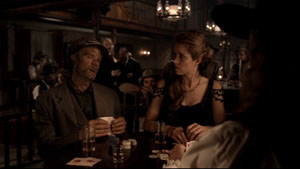 Often at odds with Swearengen on the line of morality is the Montana lawman, Seth Bullock. Bullock is an honorable individual, but he is far from perfect, and his temper often gets the best of him leading to sometimes gruesome results. He too lives by a code of morals, and while he has come to Deadwood to leave his law enforcement days in the past, it simply is not in his nature to stand idly by while injustice surrounds him. In Bullock, Olyphant has created a very intriguing and multi-layered character that is so much more than the stereotypical soft-spoken hero, all the way down to his oddly deliberate walk and the deep menacing glare in his eyes when he is losing his self-control.
Often at odds with Swearengen on the line of morality is the Montana lawman, Seth Bullock. Bullock is an honorable individual, but he is far from perfect, and his temper often gets the best of him leading to sometimes gruesome results. He too lives by a code of morals, and while he has come to Deadwood to leave his law enforcement days in the past, it simply is not in his nature to stand idly by while injustice surrounds him. In Bullock, Olyphant has created a very intriguing and multi-layered character that is so much more than the stereotypical soft-spoken hero, all the way down to his oddly deliberate walk and the deep menacing glare in his eyes when he is losing his self-control.
Another aspect of Milch's creation that demands comment is the incredible language of the series. While it is rarely seen in presentations about the period, the lawless American frontier featured a bizarre juxtaposition of ornate Victorian speech and strikingly vulgar phrasing. While the show has taken some heat for this approach, something that seems a bit laughable to me, Milch has captured the essence of this odd manner of speech, and it is simply fascinating to listen to the characters interact with one another. A simple conversation between the educated newsman (Jeffrey Jones) and the crudely uneducated Swearengen is wonderfully engrossing. Often the criticism of profanity is that those who use it lack the ability to convey their thoughts through other means, but in the case of Deadwood, that is precisely why people speak that way. In such a lawless world, everyone has a gun at his side and a chip on his shoulder, and saying the wrong thing could mean a hole in your chest. By lacing their speech with wild obscenities, people not only accomplish the task of posturing a confident "don't mess with me" stance like animals in the wild, but at the same time, they avoid saying anything of genuine substance that may end up angering someone with an axe to grind. The way this has been achieved in Deadwood is a truly remarkable accomplishment of stylish writing and one that continues to fascinate me with each passing episode.
Perhaps the most impressive achievement of this series is the way it effortlessly juggles the stories of so many diverse characters, and to keep this review from reaching an epic length that would rival Dr. Zhivago, I've virtually ignored half of them, including the proprietors of the rival Bella Union Saloon, the oafish but well-meaning newspaper reporter, the seizure-afflicted and insightful reverend (Ray McKinnon), Swearengen's right-hand man (W. Earl Brown), his complex and favored prostitute Trixie (Paula Malcomson), and a brilliant performance from Garret Dillahunt as the famed Jack McCall. Each of these characters has a deeply detailed story that is woven beautifully into the fabric of the overall show, and considering that nearly every one of them is a real individual from the town's actual history, it is a staggering accomplishment that the viewer is never overwhelmed by this wealth of characterization.
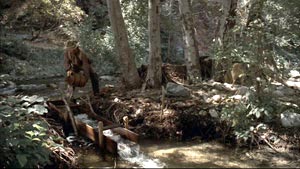 Much like HBO's other period drama Carnivàle, Deadwood also succeeds greatly in the area of set design and cinematography. How these worlds are created for television never ceases to amaze me, and the production crew has done an absolutely stellar job capturing the look and feel of this period in American history. From the costuming to the sets to the casting, everything feels amazingly authentic, and from the start of the creative opening credits, the viewer is immediately transported to this unique era. In other reviews I have remarked on the talent of Junie Lowry-Johnson as a casting director, and her skills are in top form once again with this series. The only drawback to the casting is that the show feels a bit too much like Tombstone at times. Putting aside the fact that both feature Powers Boothe and Paula Malcomson as prominent characters as well as the obvious similarities between Wyatt Earp and Bullock, Keith Carradine's "Wild Bill" is a dead ringer for Sam Elliott's Virgil Earp, and there are times when you would swear that Olyphant's Seth Bullock had been secretly replaced by Bill Paxton. I must be clear that these are minor quibbles with otherwise fantastic casting, and the performances of both Carradine and Olyphant are far more detailed and nuanced than the counterparts they sometimes resemble. While the association is sometimes distracting, the acting is so strong that I would not want it any other way.
Much like HBO's other period drama Carnivàle, Deadwood also succeeds greatly in the area of set design and cinematography. How these worlds are created for television never ceases to amaze me, and the production crew has done an absolutely stellar job capturing the look and feel of this period in American history. From the costuming to the sets to the casting, everything feels amazingly authentic, and from the start of the creative opening credits, the viewer is immediately transported to this unique era. In other reviews I have remarked on the talent of Junie Lowry-Johnson as a casting director, and her skills are in top form once again with this series. The only drawback to the casting is that the show feels a bit too much like Tombstone at times. Putting aside the fact that both feature Powers Boothe and Paula Malcomson as prominent characters as well as the obvious similarities between Wyatt Earp and Bullock, Keith Carradine's "Wild Bill" is a dead ringer for Sam Elliott's Virgil Earp, and there are times when you would swear that Olyphant's Seth Bullock had been secretly replaced by Bill Paxton. I must be clear that these are minor quibbles with otherwise fantastic casting, and the performances of both Carradine and Olyphant are far more detailed and nuanced than the counterparts they sometimes resemble. While the association is sometimes distracting, the acting is so strong that I would not want it any other way.
For all its strengths, Deadwood is not a perfect show. It focuses so heavily on the characters that at times it moves at a snail's pace. As a fan of shows like The Wire and Carnivàle, I am certainly no stranger to deliberate pacing, and for the most part I prefer this attention to detail far more than needlessly fast-paced shows like 24 or procedural episodic series like C.S.I.. However, there are times in the middle of this first season were Deadwood strays a bit too far to the side of character development, and the episodic plots become overly meandering. With only 12 installments to accomplish this story, the writing could have been a little tighter in some of the episodes. The first and last episodes of the season are brilliantly done, as is the fourth episode "Here Was a Man", but a couple of the ones in between fall short of the high standards set by these others. Considering all the ways this series excels, it almost seems petty to fault them for this, but there is room for improvement, and I hope that with this first season under their belts they can tighten up some of the storytelling in the future.
As noted, first and foremost, Deadwood is a character drama. It is a study of our own humanity and how we are often unable to avoid our basic nature. Calamity Jane wants to be a loud-mouthed, posturing, bull-whipping drunk, and she succeeds most of the time, but she cannot hide from her compassion for the sick and her need to nurse them. Bullock wants to be a simple hardware store owner, but his sense of justice compels him to always be more than that. As "Wild Bill" says to his good friend Charlie, "some goddamn point a man's due to stop arguing with hisself and feeling twice the goddamn fool he knows he is 'cause he can't be something he tries to be every goddamn day without once getting to dinnertime and fucking it up. I don't want to fight it anymore, understand me Charlie?" Sometimes you just have to be who you are, and as the series progresses, many of these characters come to realize this. They also find the importance for community, both as a structural support for their business interests as well as emotional support for the basic need of human companionship. Deadwood is the story of all these varied characters and their struggle to find that community in spite of their different interests and motivations, and it is incredibly well done.
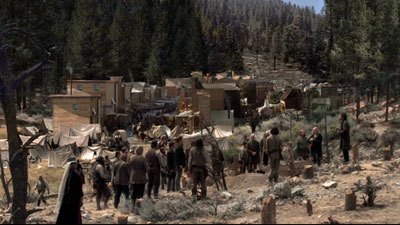
The first season of Deadwood includes the following 12 episodes spread across 5 discs with 1 bonus disc:
- 1.01 - Deadwood (03.21.04)
- Commentary by Series Creator/Executive Producer David Milch
- 1.02 - Deep Water (03.28.04)
- 1.03 - Reconnoitering the Rim (04.04.04)
- 1.04 - Here Was a Man (04.11.04)
- Commentary by Stars Keith Carradine and Molly Parker
- 1.05 - The Trial of Jack McCall (04.18.04)
- Commentary by Stars Brad Dourif and Robin Weigert
- 1.06 - Plague (04.25.04)
- 1.07 - Bullock Returns to the Camp (05.02.04)
- 1.08 - Suffer the Little Children (05.09.04)
- 1.09 - No Other Sons or Daughters (05.16.04)
- 1.10 - Mister Wu (05.23.04)
- 1.11 - Jewel's Boot is Made for Walking (06.06.04)
- 1.12 - Sold Under Sin (06.13.04)
- Commentary by Stars Ian McShane and Timothy Olyphant
- Featurette: "Making Deadwood: The Show Behind the Show"
- Featurette: "The Real Deadwood"
- Featurette: "The New Language of the Old West"
- Featurette: "An Imaginative Reality"
PRESENTATION:
Deadwood is yet another impressive presentation from the folks at HBO. The 12 episodes in this set are spread across five discs with a sixth disc devoted to special features. These discs are maintained in a six-panel structure that folds up and fits neatly within a larger box. Instead of the typical slipcase model seen with most television sets, this box is designed so the front cover is hinged to the case and can be opened to reveal the discs. While it looks really beautiful, unfortunately, it is not very practical. Since most sets will stand on their side on a shelf, the loose hinging mechanism on this one could easily flop open if not flanked by other DVDs or bookends. Also, with a slight protruding border on the outer case, it is a little oversized and may not fit on some shelves. Finally, while the cardboard is more durable than most, it is manufactured in such a way that the combination of shipping and shrink-wrapping, or just simple use over time, will likely render many of these cases torn. I hate to complain about the nice artistic result, but it simply is not a practical packaging solution for the average viewer.
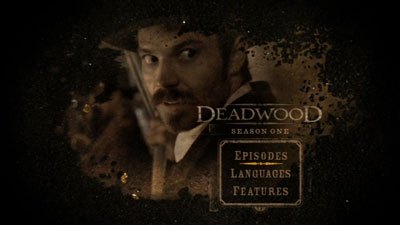
As expected with an HBO release, the video quality is fantastic. Presented in anamorphic widescreen, each episode wonderfully captures the dark and rich palette of the series. To accommodate the sixth special feature disc, two of the discs contain three episodes each, lowering the available bit rate, but there is no noticeable drop-off in quality. Some edge enhancement does appear in dark interior scenes that are set against brightly lit exteriors, but it is nominal and hardly distracting.
There are three 2.0 Surround tracks (English, Spanish, and French) as well as a primary Dolby Digital 5.1 English track. The audio for this mix is clean and clear with some good use of the surround channels. The background sounds and dialogue are balanced very well, and not once did I find myself straining to hear something more clearly.
WHISTLES & BELLS:
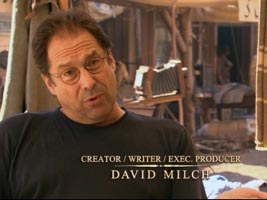 Included on this set is a pretty nice group of bonus features, considering that HBO typically is sparing in this area. On the sixth disc are four featurettes, the first a 13-minute piece called "Making Deadwood: The Show Behind the Show". This is your typical "making of" featurette that includes interviews with those involved with the show. Fortunately, it is not a fluff piece intended solely for promotional purposes, and it is not overly bogged down with clips from the series. Although short, there is some good detail to be found here. Also, of the four, this is the only one that is presented full frame. The rest are anamorphically enhanced widescreen.
Included on this set is a pretty nice group of bonus features, considering that HBO typically is sparing in this area. On the sixth disc are four featurettes, the first a 13-minute piece called "Making Deadwood: The Show Behind the Show". This is your typical "making of" featurette that includes interviews with those involved with the show. Fortunately, it is not a fluff piece intended solely for promotional purposes, and it is not overly bogged down with clips from the series. Although short, there is some good detail to be found here. Also, of the four, this is the only one that is presented full frame. The rest are anamorphically enhanced widescreen.
The second featurette, "The Real Deadwood", runs longer at 25 minutes and is a wonderful in-depth look at the real history of the town of Deadwood and how it relates to the series. Combining interview footage of legitimate experts and historians with that of the creators of the show, you get a feel for what Deadwood was really like and the care Milch and company have taken to be as accurate as possible. There is some overlap between these two featurettes, but they are both certainly worth watching.
The third and fourth featurettes are essentially just two halves of a "discussion" between Keith Carradine and David Milch. I put the term in quotes because really it's just an hour of David Milch talking about the show with some brief cues from Carradine on what to talk about next. These two pieces are completely engrossing, and there is no doubt that Milch has done his research on the location and period and has a keen understanding of how to create compelling characters for dramatic television. The hour flies by, and I found I could have listened to him talk about the series for many more hours on end. The two halves are billed on the disc as "The New Language of the Old West" and "An Imaginative Reality", but those are just the introductory topics discussed in each segment. The complete product talks about those topics in detail as well as numerous others, and it is a wonderful inclusion on the set.
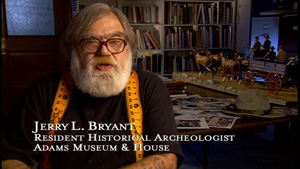 Accompanying the episodes are four full-length audio commentaries. The first is on the pilot episode and includes David Milch by himself. For all the fascinating information he shares in the discussion featurette, this commentary is really quite boring. I was very disappointed, as it is clear that he has quite a bit of knowledge and insight to share, yet very little of it shows up in this commentary.
Accompanying the episodes are four full-length audio commentaries. The first is on the pilot episode and includes David Milch by himself. For all the fascinating information he shares in the discussion featurette, this commentary is really quite boring. I was very disappointed, as it is clear that he has quite a bit of knowledge and insight to share, yet very little of it shows up in this commentary.
The second commentary is on the fourth episode, "Here Was a Man", with Keith Carradine and Molly Parker, and it is significantly more interesting and entertaining than the first. The two of them share a clear love for the show and their characters and it shines through in their discussions. Also wonderfully engrossing is the commentary with Brad Dourif and Robin Weigert on the fifth episode, "The Trial of Jack McCall". Having seen Dourif speak at various public events, I have always found him to be fascinating in his descriptions and love for his craft, and this commentary showcases every bit of that. Weigert is the perfect companion for him on this commentary, and the two of them do an excellent job providing additional information about the show and how it was created.
The final commentary is for the season finale and is with Ian McShane and Timothy Olyphant. While it would be accurate to say that this effort defies description, I would not be doing my part if I did not at least try. The camaraderie between these two actors is evident from their opening words to each other, and the entire commentary is laced with mockery of one another's work, deliberate rambling over their respective scenes, and hilarious impressions of other cast members. There isn't too much insight into the production of the show, but it is undeniably unique and entertaining.
Of note, the first disc leads in with a 2-minute promotional piece from HBO set against the Devlins' song "World Outside" and is a nice reminder of how lucky we are to have Sunday nights.
CONCLUDING THOUGHTS:
HBO is so far ahead of the rest of television right now that it is almost unfair to mention anyone else (with the exception perhaps of FX) in the same breath, and Deadwood is the latest in a continuing line of remarkably high quality dramatic programming. In many ways, it is similar to the hugely successful Sopranos as a richly detailed morality tale with strong and dynamic characters, but whereas the former focuses heavily on the meaning of family, this stylistic period piece features a different kind of community that is formed in spite of itself in the isolated and lawless frontier of 1870s America. As a character study, there is almost nothing like Deadwood on television, and as dramatic storytelling it succeeds far more than it fails. I guess if you are easily offended by the raw nature of the speech and activities of this period in American history, then you may want to steer clear of this show, but for anyone else looking for compelling characters and a fascinatingly detailed and realistic portrayal of the American West, I Highly Recommend this set.
|
| Popular Reviews |
| Sponsored Links |
|
|
| Sponsored Links |
|
|
| Release List | Reviews | Shop | Newsletter | Forum | DVD Giveaways | Blu-Ray | Advertise |
|
Copyright 2024 DVDTalk.com All Rights Reserved. Legal Info, Privacy Policy, Terms of Use,
Manage Preferences,
Your Privacy Choices | |||||||












